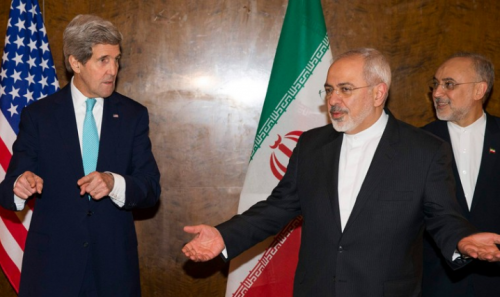PHOTO: US Secretary of State John Kerry and Iranian Foreign Minister Mohammad Javad Zarif, March 2, 2015
Nicholas J. Wheeler and Joshua Baker of the University of Birmingham write for the Birmingham Brief:
Announcing the nuclear deal agreed this week between the Islamic Republic of Iran and the so-called E3+3 (the EU3 of France, Germany and the United Kingdom plus the United States, Russia, and China), US President Barack Obama declared: “This deal is not built on trust, it is built on verification.”
The same line was used by Obama and Secretary of State John Kerry in November 2013, when the two sides reached agreement on an interim Joint Plan of Action (JPOA), now subsumed within the final comprehensive agreement.
Yet, despite Obama’s public dismissal of the role played by trust, the top US negotiators would not have signed this deal had there not been trust in their Iranian counterparts.
Obama’s statements this week do not indicate that trust was absent. Instead, it is an irony that a concept so valued in interpersonal relations is seen by leaders –– especially when dealing with adversaries –– as being toxic to international relations. This is because they worry that appeals to trust will be seen as a naive and ineffectual basis on which to formulate national security policy.
Circumstances around the agreement bolster this concern. Although the deal has been hailed in many quarters as a great success, it faces a serious challenge from those members of Congress who see it as betraying US interests and selling out America’s friend, Israel. Faced with the hard task of legitimating the Iran deal to a suspicious and hard-line US political elite, it is not surprising that Obama has eschewed the “soft” language of trust in favor of the “hard” technical promise of a verification regime that is unprecedented in nuclear diplomacy.
There is no level of verification that can stop a determined proliferator with the technological capability to make nuclear weapons. This is why opponents of the deal, who believe Iran is hell-bent on acquiring nuclear weapons, are not satisfied that any level of inspections can provide assurances that Iran’s nuclear program is only for peaceful purposes. Consequently, even with the most robust verification machinery in place, there still has to be some level of trust at the highest levels of the US Government in the sincerity and integrity of those negotiating on behalf of Iran.
The strong personal chemistry between Kerry and his Iranian counterpart, Foreign Minister Mohammad Javid Zarif, should not be underestimated in any explanation of how the Iran deal became possible. Their frequent face-to-face interactions, including the last two weeks spent together completing the deal in Vienna, appear to have fostered mutual respect, growing empathy, and trust in each other’s bona fides.
Then there is trust within political communities. Obama has relied heavily on Kerry to deliver the jewel in the crown of his foreign policy legacy, and without his trust in the Secretary of State, it is hard to imagine that the Iran nuclear deal would have taken the shape it did.
With the deal completed and Phase II of implementation beginning, there is a further dimension of trust involved. Are Obama and Kerry right to trust that President Rouhani and Zarif will retain the political capacity to follow through in the face of Iranian elements that might actively oppose it? The Obama administration might reply that the so-called “snap-back” provisions in the agreement, under which sanctions would be reimposed in the event of Iranian non-compliance, are a safeguard against this eventuality.
But this response does not negate that US officials are trusting in the authority of Rouhani and Zarif. The Boston Globe reported that in a particularly heated exchange during the endgame in Vienna, Kerry demanded to know from Zarif: “Do you have the authority to negotiate this deal and bring it to closure?” Zarif reportedly confirmed that he did.
The authority question, and the issue of trust that resides in it, is crucial as to how far Iranian negotiators retain the confidence –– and indeed the trust –– of Iran’s chief nuclear decision maker, the Supreme Leader. In previous negotiations, it has been the Supreme Leader who has pulled the plug on any prospective agreement — for example, over the 2009 fuel swap proposal — and retaining his support is crucial to implementation.
So while Kerry and Zarif have developed a relationship of interpersonal trust — an important factor in securing the deal —there is a continuing trust deficit at the level between the US and Iranian States. Indeed, Obama’s appeal to verification and not trust is indicative of how far the two countries have been locked into cultures of distrust. This distrust has been institutionalized within structures of government in both Washington and Tehran and is deeply embedded in societal narratives.
And so we watch a new phase of a story of many years: can the interpersonal trust which may have brought the present agreement be embedded in the habits and practices of two entire systems?
Nicholas J Wheeler is Professor of International Relations and Director of the Institute for Conflict, Cooperation and Security, University of Birmingham. Joshua Baker is a Doctoral Researcher at the ICCS.

